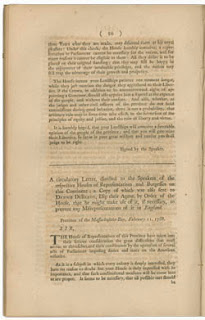Text- Based Primary Sources
"To a Sister Colony"
This letter is written by Samuel Adams and James Otis of the Massachusetts general court house of representatives. The letter addresses the grievances that the Townshend Acts have put on Massachusetts and the other colonies. This source serves as protest to the Townshend acts and is one of the first major steps in unifying the colonies against the British. This website provides several primary sources on the Townshend act.
Prospect Hill, Bunker Hill, "The Blood Of Your Fellow Subjects"
This source is a handbill written by anonymous authors with the intent of persuading British Troops to desert to the American forces. This pamphlet was circulated through out the British camp prior to the battle of Bunker Hill. The source can serve as a great example of early propaganda, and help shine light on an often neglected part of the American revolution; there was some colonial support in British parliament and British army.
Letter from John Adams to Abigail Adams, 3 July 1776- "Posterity Will Tryumph"
In this letter from John to Abigail Adams, John writes about the struggle, the progress and the success of achieving a Declaration of Independence. This primary source could be used as an inside humanist perspective of the events at this time. It can also be used to understand John and Abigail's relationship. The source has many interesting qualities that give a firsthand account of the congress in Philadelphia. This site also has several primary sources dealing with the Declaration of Independence.
Maryland Gazette, (Green), Annapolis, July 9, 1767.
This is a newspaper article from the Maryland Gazette in 1767. It describes the Quarantine Act, designed to quarantine ships coming into port. The source provides a great account of the horrible conditions that slaves endured on these ships, the diseases that were present measure taken to stop them. The source could be used on a study of the geography of slavery or slavery during the revolutionary times. This website provides official records, newspaper articles and personal accounts of Slavery during this time period.




These are great, Rob! They really bring the time period to life!
ReplyDeleteThanks for posting.
Shaunna